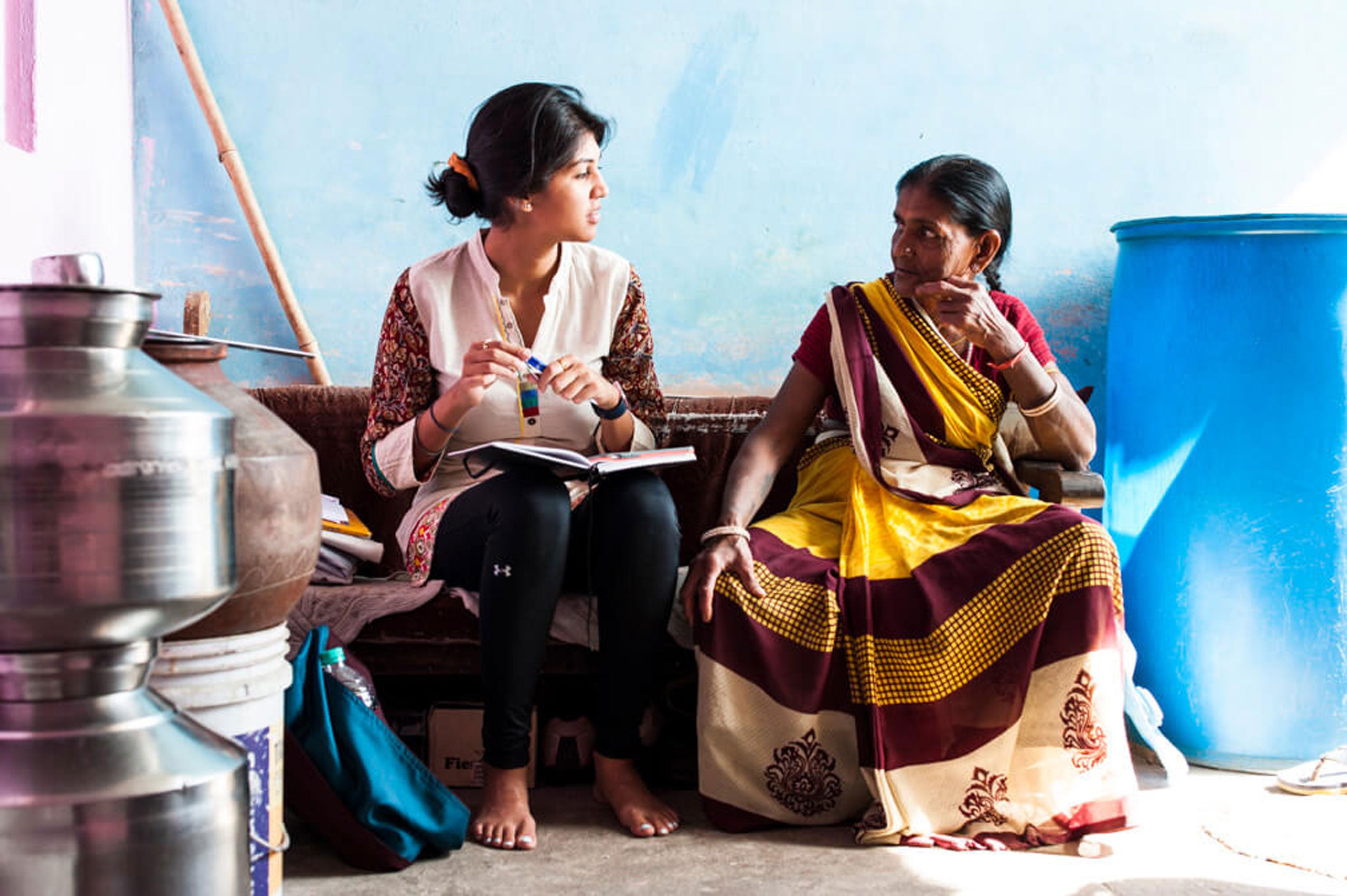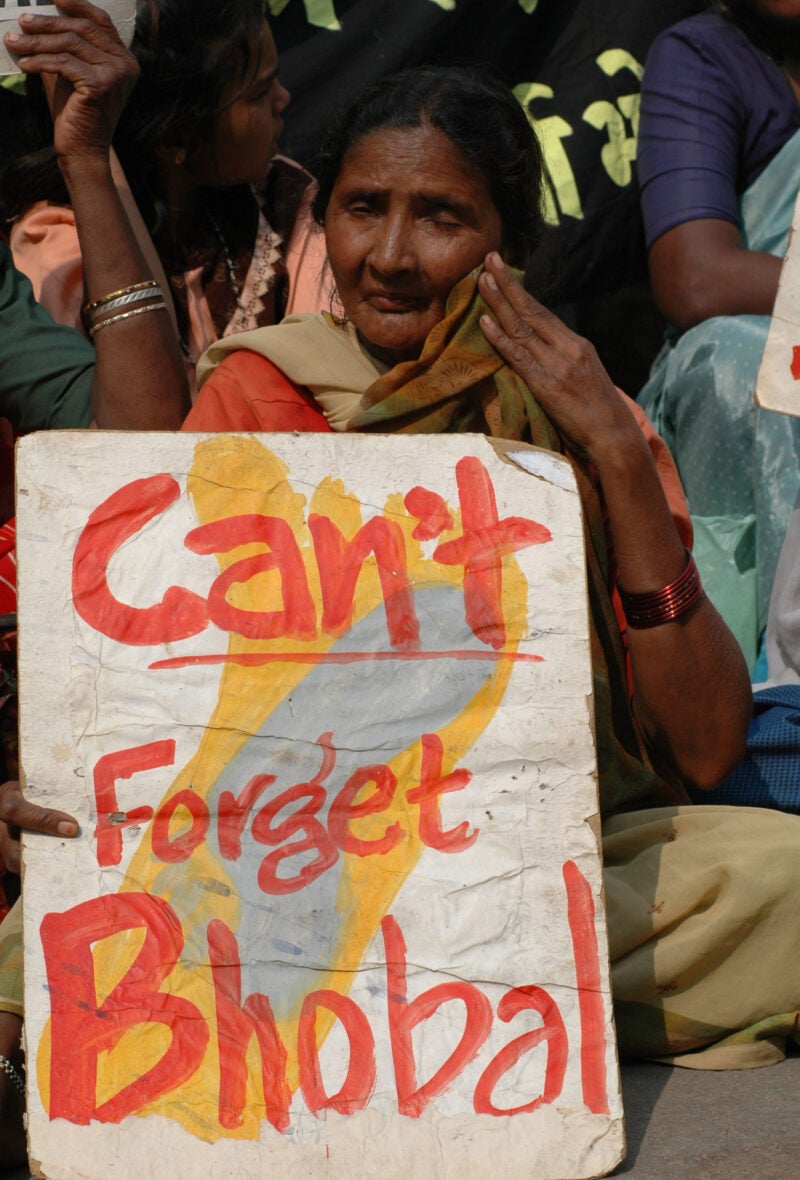In early December 1984, a leak at an American-owned manufacturer of pesticides exposed half a million people in Bhopal, India to a toxic gas, killing 8,000 in the immediate aftermath, according to one estimate, and sickening countless others. Later, lawsuits and criminal cases would blame the company’s lax safety protocols and delayed warnings to surrounding communities for thousands of additional deaths, disabilities, and diseases in the months and years following the disaster.
Yet despite the widespread — and ongoing — impact of the tragedy at Bhopal, the story of the catastrophe and the corruption from which it emerged is still not well known by many outside India, says Apoorva Dixit ’24, a student at Harvard Law School.
In fact, despite having been born in Bhopal to a father who himself survived the tragedy as a young man, Dixit did not learn about what has been called “the world’s worst industrial disaster” until she read a passing reference to it in her seventh-grade social studies textbook in Memphis, Tennessee. “I went home and asked my dad about it, because as a 12-year-old, I honestly assumed they were talking about some other Bhopal. I couldn’t believe this was so close to home and I had never known.”
Once she began delving deeply into the accident, she knew the world needed to hear the story. Recently, Dixit and her childhood best friend Molly Mulroy collaborated on a seven-part podcast series, “They Knew Which Way to Run,” the result of hundreds of hours of firsthand interviews with survivors, activists, and residents of Bhopal. The program traces the lead-up to and aftermath of the tragedy — in the words of the people who lived through it.
Remembering and forgetting

Dixit’s parents moved to Memphis when she was five years old, but growing up, she would often visit her grandfather back in Bhopal, a city she found fascinating. As an undergraduate at Dartmouth, Dixit majored in anthropology, and took a particular interest in ethnography, or the study of peoples and their cultures.
She also continued to think about the Bhopal gas tragedy. What had really happened that day? How did Bhopalis remember the events? Why didn’t more Bhopalis, like her father and grandfather, talk about it? How did the second-generation of survivors, people like Dixit, think about it? And why didn’t more people know about it?
Dixit decided that she wanted to go to the source to learn more. In 2017, she received a Fulbright Scholarship to travel to Bhopal and interview survivors, activists, and others who experienced the tragedy. “The plan was to look at the idea of collective memory — how different communities remember events,” says Dixit.
The plan [for traveling to Bhopal] was to look at the idea of collective memory — how different communities remember events.
Apoorva Dixit
Her trip yielded interviews with nearly 100 people from a variety of backgrounds. She spoke with poor residents, who, because they lived close to the factory in a lower-lying part of the city, had been the most devastated by the leak. She talked to wealthier Bhopalis, who recalled the events of 1984 with a deep sadness, but also at a remove. She even interviewed her father and grandfather, the latter of whom had been a judge at the time.
But Dixit says the most moving stories were those of the activists, many of whom were women, who had used the law and public protest to fight for compensation for themselves and their families, and who continue to do so today against great odds. “There is a lot that they are still fighting for. They have lost loved ones. The factory has never been removed, and toxic waste still pollutes the water in the area,” she says. “So, for them, recalling the tragedy was less of a memory, less of a theoretical exercise, and more of a living, breathing thing.”
The experience was both difficult and fulfilling, she says. “Never in my life have I felt so deeply pulled toward something, especially something so painful for so many people.”

Speaking and listening
Before she had left for Bhopal, Dixit’s friend Mulroy suggested that they turn the materials she gathered there into a podcast to showcase and amplify the voices of survivors of the tragedy. The pair started thinking about the story and processing the interviews while Dixit was in India, but did not get far before the year was over and Dixit returned to the U.S., moving to Boston for a job in consulting.
In the end, what the team thought would be a short project “ended up turning into a five-year undertaking,” says Dixit, adding that there was much to explore. “What was the lead up to it? What happened in the decades since 1984, and what is happening today to the survivors I met? I also wanted to highlight the difference in how people like my family, who are fairly privileged, remember the tragedy, versus those who are relatively under-resourced.”
At first, the work was slow going. Dixit had to translate all the interviews into English so that they could begin building a narrative, and the story that emerged was complex, with many different pieces. “We tried an initial episode where we threw the whole story in, just a lot of information, but we couldn’t go deep enough to do it justice,” says Dixit.
Mulroy, who had previous experience in podcasting, offered a solution. “Molly said, ‘Find someone who does not know anything about you, but who you trust, and record yourself telling them the story. Think about what chronology you use, what parts you emphasize, and what parts are they interested in.’ And so, I did.”
“[The podcast highlights] the power of remembrance, the power of movement building, the incredible resilience that activists of Bhopal have shown.”
Apoorva Dixit
Dixit’s storyline became the basis of the series, the first episodes of which describe how the U.S.-based company, Union Carbide, came to establish its factory in Bhopal, and the years of neglect of maintenance and safety measures that preceded the gas leak. Then, Dixit and Mulroy turn to the activists, survivors, and other residents of Bhopal who have continued to press the government and the company, which is now part of Dow Chemical, for redress.
“One leader in the movement for justice for survivors, Rashida Bi, really inspired me,” she says. “She has achieved so much. She also has a great way of telling her story. She was never formally educated, but she is so obviously brilliant, and her way of setting the scene and making comparisons and metaphors was different from what I was used to. She is captivating.”
Looking back, looking forward
To Dixit, the stories that emerged from the podcast contain lessons for anyone seeking to make change, including “the power of remembrance, the power of movement building, the incredible resilience that activists of Bhopal have shown,” she says. The grassroots movements they created shows how others can succeed, because “the activists faced every structural barrier possible — including resistance from the government — and yet they have created a whole network of institutions to serve themselves, including schools and medical clinics.”
And the process of listening itself bore insights, adds Dixit. Because she had to replay the interviews repeatedly while editing the podcast, she found herself gaining new understandings of the tragedy. She also began to see how similar patterns of remembering and forgetting, of inequality and privilege, play out in other crises, a connection she made in a TedX talk that now has more than 32,000 views.
“I think the story of the Bhopal gas tragedy has a lot of lessons to teach in terms of how COVID will be remembered by the next generation, and even by the generation that is currently experiencing it,” she says. “When you are actually in the eye of a disaster, it brings community together. It can bring out the best in people. But once a crisis becomes long-term enough, people move on — especially those who can afford to do so.”
Even as Dixit tackles her next goals — her studies at Harvard Law, her work with Harvard Defenders, a future in civil rights litigation — she promises she won’t move on from working to ensure the world knows about the Bhopal gas tragedy, nor the wisdom she has gleaned from the people who shared their stories. “I’ve seen how the law can be such a powerful tool for change, both good and bad,” she says. “I want to use it for good.”
